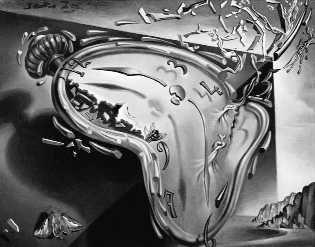Getting real with surreal
While I tend to forget most dreams, those that occur during the sleep that I slip into after a break (caused by a noise, or the urge to visit the restroom or quench thirst) often leave a trail of strange but vivid memory of images that defy logic.
Just today, I woke up trying to decipher this dream: a bus ride, negotiating a winding hilly neighbourhood that had a cottage with the nameplate clearly depicting “WHO’s who”! Entry to the picturesque bungalow eluded me as most of the time I was going round and round, skirting another vehicle at the corner or finding an appropriate parking lot for the long bus on a narrow roadside.
The first few moments, after I opened my eyes, went in a stupor, the unreality of it all leaving me dazed. It was so surreal. Then, as the day’s chores took over, the bizarre dream faded, and I took solace in the thank-god-it-was-just-a-dream logic.
I have never been much of a Sigmund Freud fan though I have studied his theory of psychoanalysis in my undergraduation class of psychology. Freud propounded that despite the urge to repress desires, the unconscious (id) wins over the conscious (ego), revealing itself in baffling dreams, strange myths, odd behaviours, slips of the tongue, freaky accidents and outlandish art.
As a student of literature, I also read about the surrealist movement in Europe in the 1920s wherein radical new art forms, ideas and techniques were employed by artists and poets apparently influenced by Freud. They gave wings to their imagination and came up with juxtapositions of the conscious and the unconscious.
Surreal was declared word of the year 2016 by Merriam Webster Dictionary this week because lookups for the meaning of the word spiked during the year following certain shocking and surprising events considered bizarre by people. Surreal is defined as "marked by the intense irrational reality of a dream," or "unbelievable, fantastic". Unsurprisingly, the maximum number of people turned to the dictionary for the meaning of surreal after November 9 when Donald Trump was declared the US President-elect.
Incidentally, that was also the exact time when we Indians were dealing with the most surreal event of the year: the demon of demonetisation had been unleashed upon us by Prime Minister Narendra Modi. With the declaration of Rs 500 and Rs 1,000 notes (comprising 86% of the currency) as illegal tender, in one stroke, 1.2 billion Indians were made to suffer the nightmare of retrieving their own money from banks ill-equipped to tame the demon. The theatre of the absurd is continuing almost two months later, with little signs of abating.
If the demonetisation drama had been described as surreal, really not only Merriam-Webster, but also Oxford and Dictionary.com would have in reality registered rapid rises in recalling surreal rather than any other word. But with dictionaries not much being the go-to tomes in India, the lookups tend to be more West-specific.
The year’s top choice of Oxford turned out to be "post truth" (an adjective defined as relating to or denoting circumstances in which objective facts are less influential in shaping public opinion than appeals to emotion and personal belief). Donald Trump’s campaigning was mainly at the bottom of this pick of the word. And, Dictionary.com declared "xenophobia" (dislike of or prejudice against people from other countries) as its word. Mass migrations triggering racist tendencies and hatred managed to mire the masses in matters xenophobic.
And, when hatred led to terror strikes, it created surreal situations. At various points of time in the year, the word surreal was equated with certain tragic moments: after the Brussels bombing in March, Turkey’s failed coup and the Nice terror attack in July.
Peter Sokolowski, Merriam-Webster’s editor at large, said that all three incidents received huge attention around the globe and had many in the media reaching for "surreal" to describe both the physical scenes and the "mental landscapes." He sums it up as: "Surreal has become this sort of word that people seek in moments of great shock and tragedy." Delving into history, the lexicographer said the word “surreal” didn’t exist until around 1924, after a group of European poets, painters and filmmakers founded a movement they called Surrealism. They sought to access the truths of the unconscious mind by breaking down rational thought. And it wasn’t until 1937 that “surreal” began to exist on its own.
But thankfully, today is really Christmas. Hope Santa showers you with your dream gift.
hkhetal@gmail.com










